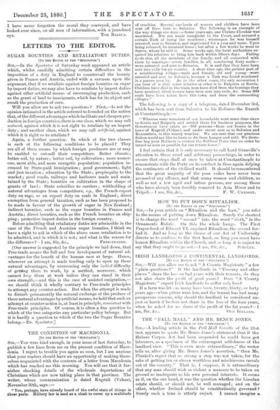LETTERS TO THE EDITOR.
SUGAR BOUNTIES AND RETALIATORY DUTIES.
[TO THE EDITOR OF THE "SrEcrATHE.-1
Sin,—In the Spectator of Saturday week appeared an article which, whilst candidly admitting certain difficulties in the imposition of a duty in England to countervail the bounty given in France and Austria, ended with a sarcasm upon the argument, that if we retaliate against foreign bounties on sugar by import duties, we may also have to retaliate by import duties against other artificial means of encouraging production, such as the grant of land to immigrants, which has for its object and result the production of corn. Will you allow me to ask two questions ? First,—Is not the opinion intimated in the article referred to founded on the notion that, of the different advantages which facilitate and cheapen pro- -auction in foreign countries, there is one class, which we may call natural, against which it is not right to retaliate by an import -duty ; and another class, which we may call artificial, against which it is right so to retaliate ?
Again, a further question. In which of the two classes is each of the following conditions to be placed ? They -are all of them means by which foreign producers are or may be enabled to out-sell their competitors. Better climate ; -better soil, by nature ; better soil, by cultivation; more numer- -ous, more able, and more energetic population; population in- creased by State-paid immigration ; good government ; light -and just taxation ; education by the State; propinquity to the market ; good roads, railways and harbours made and main. tamed by the State ; bounties on cultivation in the shape of grants of land; State subsidies to carriers ; withholding of natural advantages from competitors, e.g., the French export duty on rags, or an export duty on coals in England ; direct exemption from general taxation, such as has been proposed to be made in favour of the growth of sugar in New Zealand ; indirect bounties, such as the sugar bounties in France and Austria ; direct bounties, such as the French bounties on ship- ping; protective import duties in the foreign country.
Before admitting that retaliatory duties are admissible in the -case of the French and Austrian sugar bounties, I think we have a right to ask in which of the above cases retaliation is to be admitted, and in which it is not ; and what is the reason for
the difference ? — I am, Sir, &c., FREE-TRADER.
[Our answer is suggested by the principle we laid down, that Free-trade means the full and free development of natural ad- vantages for the benefit of the human race at large. Hence, wherever an attempt is made tending only to open up these natural advantages, by overcoming only the initial difficulty of getting them to work, by a method, moreover, which -cannot keep them at work unless they can stand in their -own strength,—and this is the case of assisted emigration,— we should think it wholly contrary to Free-trade principles to attempt any counter-action. But when the attempt is made to disturb permanently the natural exchange of the produce of these natural advantages by artificial means, we hold that such an attempt at counter-action is, at least in principle, consistent with Free-trade principles. Of course, it is often a fine question to -which of the two categories any particular policy belongs. But it is hardly a question to which of the two the Sugar Bounties belong.—En. Spectator.]


































 Previous page
Previous page